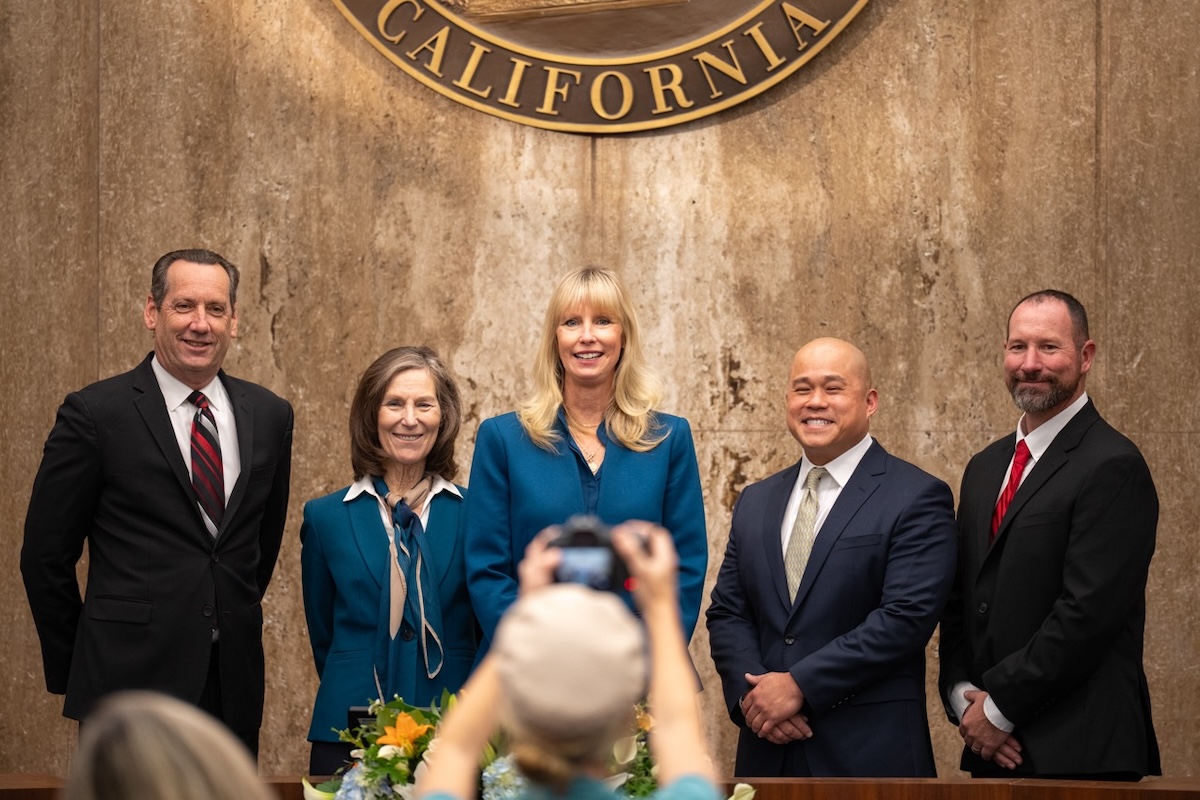The Coming Crackdown on Greenhouse Cannabis
County Supervisors Vow to Get Rid of the Smell of Pot by Tightening Odor-Control Regs Across the Carpinteria Valley

In a dramatic course correction on Tuesday, the new county Board of Supervisors set in motion a requirement for the use of state-of-the-art odor-control technology at each of the cannabis greenhouses of the Carpinteria Valley, a mecca for the industry ever since the county opened the gates to a “Green Rush” in 2018.
Over the years, as the local cut-flower industry largely converted to cannabis, residents filed more than 3,900 complaints with the county about the “skunky” smell of pot. Yet there has been zero enforcement of the complaints: It’s impossible to determine which greenhouse is to blame for the “hot spots” where the smell persists.
On Tuesday, the board unanimously approved a proposal introduced by Board Chair Laura Capps of Goleta and Supervisor Bob Nelson of Orcutt in a bid to finally solve the problem. It would amend the county’s cannabis ordinance to require the installation of advanced carbon filtration units, commonly known as “scrubbers” — or some “equivalent effective technology” — inside each of the 29 greenhouse operations approved by the county, just outside the limits of the City of Carpinteria.
“The culture of leniency is shifting,” Capps said after the hearing. She told her colleagues: “The time is right: We know what works. The complaint system hasn’t worked. Folks are fed up…. We can move forward to a new chapter.”
Under the board’s proposal, the growers would have 12 months to install scrubbers, unless they applied for an extension because of time-consuming electrical upgrades or other “legitimate challenges.” A failure to comply would result in the revocation of their county business licenses. As of last fall, county reports show, only six of 20 active cannabis greenhouse operations in the valley were using scrubbers.
As proposed, the growers also would be required to shut down the “misting” systems that they currently use to mask the pungent smell of pot. These systems set up a curtain of perfumed mist through perforated pipes on the greenhouse roofs, where the smell escapes through vents into the outside air. Many residents have complained that the “laundromat” smell of the mist is just as bad as the smell of pot.
“The Carpinteria Valley was the ground zero for the policies about cannabis,” said Roy Lee, the newly sworn-in former Carpinteria councilmember who last year narrowly beat Das Williams, a co-architect of the cannabis ordinance, in the First Supervisorial District. “I’m glad we’re taking the first steps of many to address this. There’s going to be a lot of happy people in Carp today.”
Fast-Tracking the Hearings

The board directed the county CEO’s office to draw up the proposed ordinance amendments; and the county Planning Commission is set to review them on January 29 and February 19. They would apply countywide, but the impact would be chiefly felt in the Carpinteria Valley: there is only one greenhouse operation in the North County, where outdoor cannabis has taken hold in open fields and hoop houses. It is Hidden Oaks Enterprises, half an acre of cannabis greenhouses at 5935 Dominion Road in Santa Maria.
At the upcoming hearings on cannabis odor, the Planning Commission also will fine-tune a county Planning Department proposal to test for the smell of cannabis at greenhouse property lines if the neighbors complain.
The ordinance amendments could return to the board for a vote as soon as March 25. If approved, the requirement for scrubbers would go into effect 30 days later. The state Coastal Commission would have the final say on enforcement measures at the greenhouse property lines.
“We don’t want to take months,” Capps said. She and Nelson told their colleagues that they had been working on the proposal ever since a voluntary odor-control agreement between the growers and a citizens’ group fell through in 2023 and “the optimism seemed to disappear.” Had the pact worked, Capps said, “We wouldn’t be here today.”
“Oversaturated Industry”
Since 2018, overriding dozens of appeals by residents, the county has approved zoning permits for nearly 150 acres of cannabis greenhouses in the Carpinteria Valley. (Under the ordinance, the acreage is capped at 186 acres.)
This week, the City of Carpinteria and a number of residents wrote in to the board to voice their support for a requirement for scrubbers across-the-board. Some residents objected to any extensions of the 12-month deadline.
“We have been speaking about this problem for seven years,” said Merrily Peebles, a resident of La Mirada Drive, during the public comment portion of Tuesday’s board hearing. “Seven years is a very long discussion and a long time to live in air pollution.”
The growers, Peebles told the board, have had seven years to “take seriously” the need to address the odor of cannabis from their operations. Instead, she said, “They’ve disregarded complaints, made excuses and generally ignored the health of the community.”
“This oversaturated industry has left an unfavorable connotation on Carpinteria,” Peebles added. “I’m hopeful this board will tighten the regulations as planned so Carpinteria can get back on track as a viable, happy community.”
Valerie Bentz, a valley resident who lives near Foothill and Casitas Pass Roads, said she and her husband had suffered from severe allergies ever since the cannabis industry moved into the valley. But they had stopped filing complaints, she said, “because it seemed so futile.”
“I am so, so relieved that finally the supervisors are moving forward on some mitigation,” Bentz said.
City officials and some residents, including Bentz, urged the board to establish a rule banning the smell of cannabis beyond the property lines of cannabis greenhouses. In addition, the city asked the board to establish a “proactive enforcement approach” in place of the complaint-based system, ensuring that greenhouses would be monitored at various times of day, including in the early morning and late evening when the smell tend to be more prevalent.

One grower’s perspective
It’s been more than two years since an independent study found that a brand of advanced scrubbers developed for the Carpinteria Valley by Envinity, a Netherlands air purification engineering firm, could reduce the smell of cannabis inside a greenhouse by 84 percent, on average, before it could escape through the roof vents. The Envinity scrubbers cost more than $20,000 each; in the greenhouse that was tested, they had been installed at a ratio of 10 per acre. The board proposal would allow “county approved experts” to review different ratios proposed by other growers.
Members of CARP Growers did not submit comments this week on the board’s proposal on scrubbers. In the past, the group has opposed a “one-size-fits-all” technology for all valley greenhouses, saying that growers whose operations were not close to homes or schools should not be targeted.
David Van Wingerden, a co-owner of Farmlane, with 5.6 acres of cannabis in greenhouses at 1400 and 1540 Cravens Lane, reminded the board on Tuesday that his operation was the first in the valley to install scrubbers four years ago. These units represent an earlier, simpler technology than what the board now wants to require — but they work, he said. Farmlane has shut down its misting systems and has not been targeted with odor complaints, Van Wingerden said. More advanced scrubbers may be necessary, he said, “but it is unfair to cast a blanket over the whole community … if what we have is working, why would we need better technology?”
Supervisor Nelson responded that the Farmlane scrubbers would appear to qualify as an “equivalent effective technology,” and, he said, “it wouldn’t be my intention, if that is working,” to require anything more advanced.

The North County problem
Left out of the board’s proposal on Tuesday was any solution for the odor from outdoor cannabis in the North County. The county has approved 1,180 acres of cannabis there, including hundreds of acres in the wine country west of Buellton. During harvest time in the spring and fall, the prevailing westerly winds can blow the smell as far east as Solvang. Buellton residents say the odor settles in low-lying neighborhoods with the overnight fog.
“Please work on a solution for the North County,” Nancy Emerson, a director of WE Watch, an environmental advocacy group in the Santa Ynez Valley, told the board. “Our odor dates from May to November because of staggered planting.”
Theresa Reilly of Buellton wrote a letter to the board, saying, “Many of us suffer from headaches, burning eyes, irritated respiratory systems, and the frustration of not being able to open our windows or spend quality time outdoors without discomfort.” Reilly said she could offer “no solutions” as to how to limit the smell to the property lines of outdoor “grows,” but suggested there could be ways to address the odor that is generated by harvesting, processing and transporting cannabis.
“I wish to remind you that cannabis odor control is not just a Carpinteria greenhouse concern,” Reilly wrote.
In voting for scrubbers in Carpinteria Valley greenhouses, Supervisor Steve Lavagnino of Santa Maria, a co-architect of the cannabis ordinance, said, “I’m going support this because I think it’s doable; it’s the right time to do it. I’m going to have a hard time with outdoor (cannabis), because I don’t think there’s a technology out there that’s going to work.” But Supervisor Joan Hartmann of Buellton admonished her colleagues not to leave the problem of odor from outdoor cannabis unresolved.
“I’ll die on this hill that we cannot lose sight of that, even if we’re not getting to it in this round,” she said.
Melinda Burns is an investigative journalist with 40 years of experience covering immigration, water, science and the environment. As a community service, she offers her reports to multiple publications in Santa Barbara County, at the same time, for free.
Correction: An earlier version of this story mistakenly referred to Supervisor Steve Lavagnino as Larry Lavagnino. In addition, the sole greenhouse operation in North County is Hidden Oaks Enterprises in Santa Maria, not Alamos Farm in Los Alamos as previously reported.
Premier Events
Sat, Jan 25 2:00 PM
Santa Barbara
Celebrating Cultural Diversity in Music
Sun, Jan 26 11:00 AM
Santa Barbara,
17th Annual Santa Barbara Community Seed Swap 2025
Fri, Jan 31 5:00 PM
Santa Barbara
Artist Talk at Art & Soul on State Street
Sun, Jan 26 11:00 AM
Santa Barbara,
17th Annual Santa Barbara Community Seed Swap 2025
Tue, Jan 28 5:00 PM
Zoom
Fire Safety Community Zoom Meeting
Thu, Jan 30 7:00 PM
Solvang
Lucinda Lane Album-Release Show, at Lost Chord Guitars
Fri, Jan 31 9:00 AM
Goleta
AARP FREE TAX PREPARATION
Fri, Jan 31 5:00 PM
Santa Barbara
Artist Talk at Art & Soul on State Street
Sat, Feb 08 10:00 AM
Santa Barbara
Paseo Nuevo Kids Club
Sat, Feb 08 12:30 PM
Solvang
Garagiste Wine Festival
Tue, Feb 11 8:00 PM
Santa Barbara
SBIFF – Tribute to Timothée Chalamet
Thu, Feb 13 8:00 PM
Santa Barbara








![Lompoc Opts Out of Wine Country [Corrected]](https://www.independent.com/wp-content/uploads/2025/01/Lompoc_Scenic_Hills_Vineyards_JeremyBall.jpg?resize=850%2C530)















You must be logged in to post a comment.